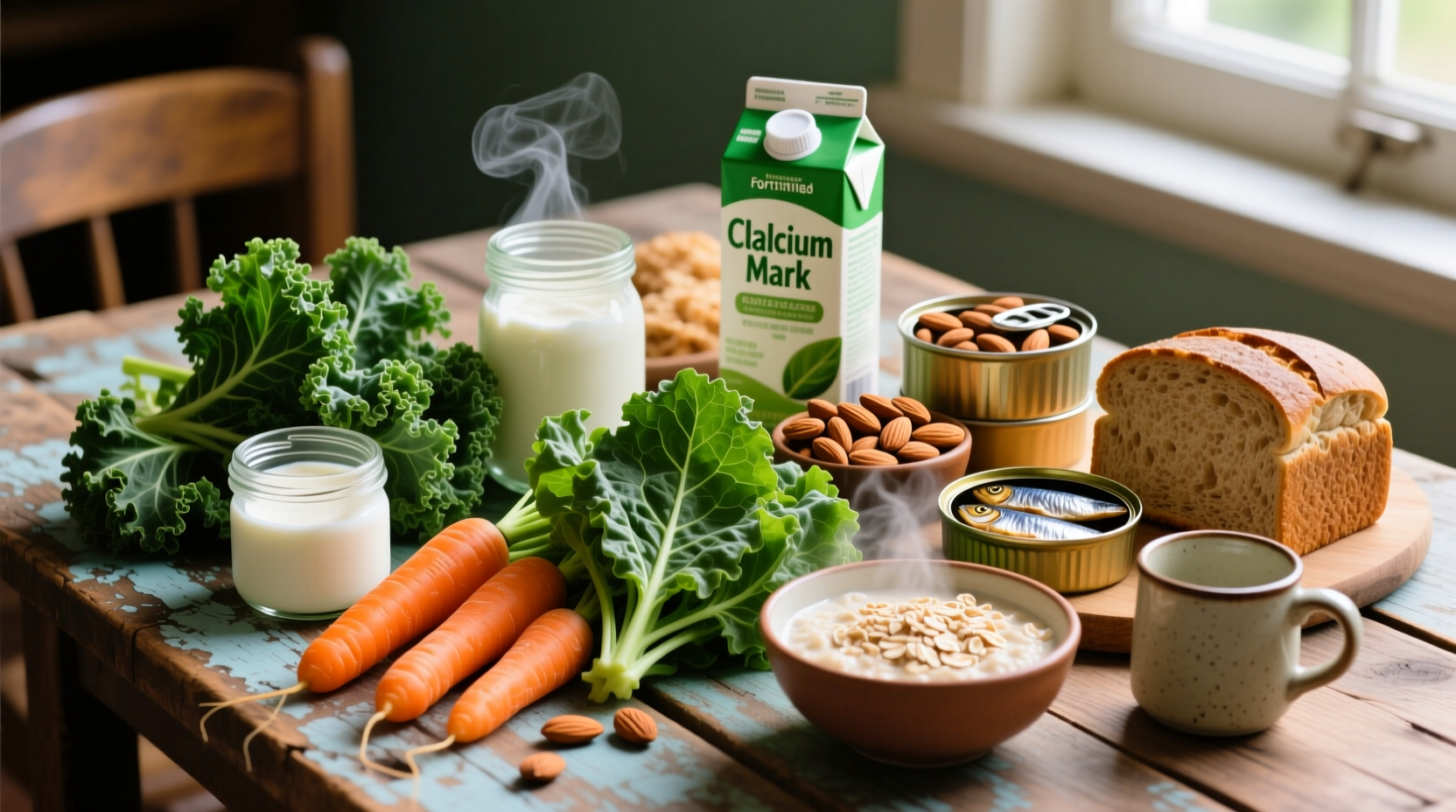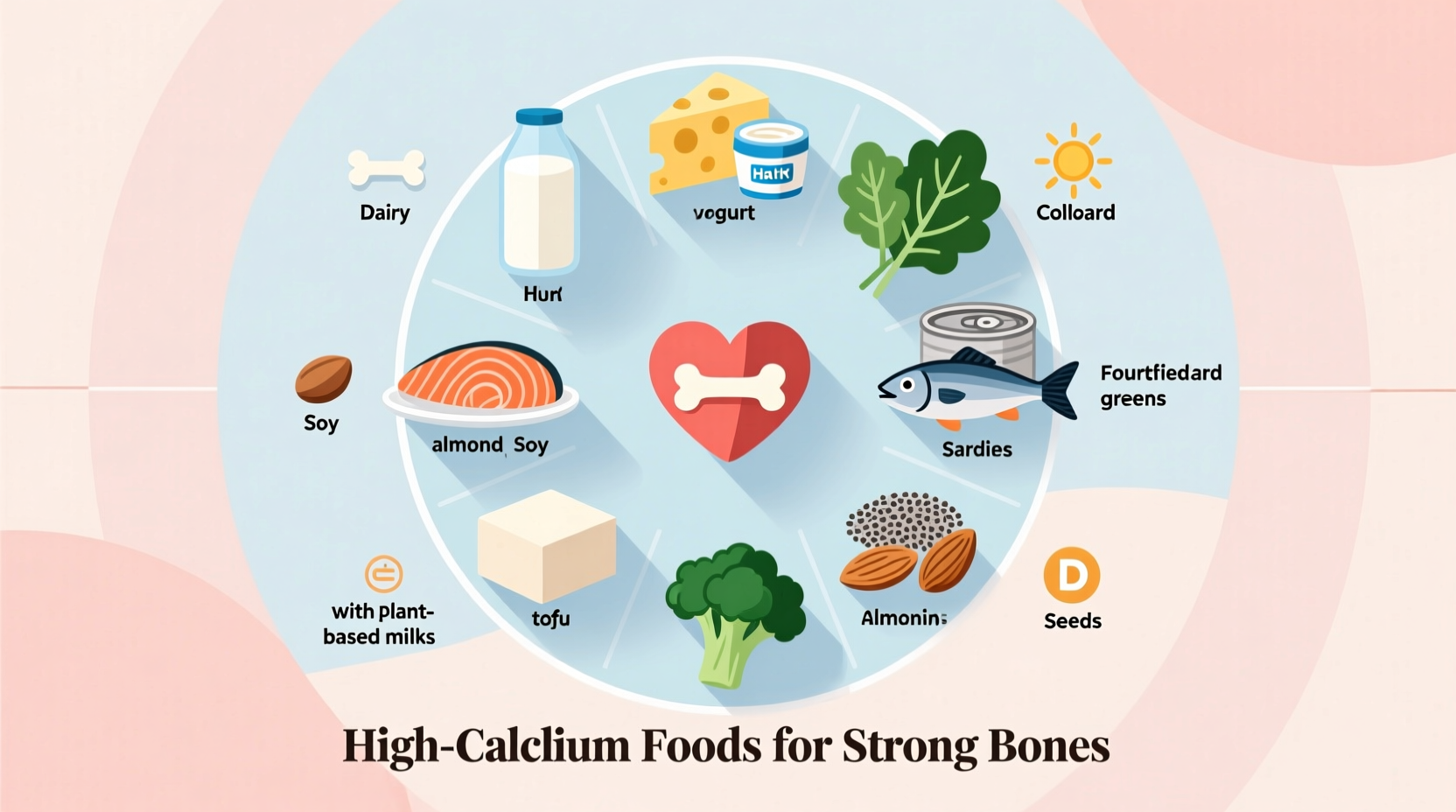Top calcium-rich foods include dairy products like milk (300mg per cup), yogurt (400mg per cup), and cheese (330mg per ounce), plus non-dairy options such as sardines with bones (325mg per 3oz), fortified plant milks (300mg per cup), and leafy greens like kale (100mg per cup). Adults need 1,000-1,200mg daily for optimal bone health.
Calcium isn't just for strong bones—it's essential for nerve function, muscle contraction, and blood clotting. When searching for what foods is high in calcium, you need reliable sources that deliver maximum nutritional benefit without compromising dietary preferences. This guide cuts through the confusion with scientifically verified options that fit various eating patterns.
Why Calcium Content Varies Across Food Sources
Not all calcium-rich foods provide equal benefits. Bioavailability—the percentage your body actually absorbs—varies significantly. Dairy calcium has 30% absorption, while plant-based sources range from 5-60% depending on compounds like oxalates. The National Institutes of Health confirms that spinach contains substantial calcium (115mg per ½ cup), but its high oxalate content reduces absorption to just 5%, making it less effective than lower-calcium kale (10% absorption rate).
| Food Source | Calcium (per serving) | Absorption Rate | Best Consumed With |
|---|---|---|---|
| Milk (1 cup) | 300mg | 30% | Vitamin D foods |
| Sardines (3oz) | 325mg | 25% | Lemon juice |
| Fortified almond milk (1 cup) | 300mg | 20% | Vitamin D supplement |
| Kale (1 cup cooked) | 180mg | 40% | Olive oil |
| Chia seeds (2 tbsp) | 180mg | 20% | Lemon or vinegar |
Dairy Powerhouses: Beyond Basic Milk
While milk remains a top choice for foods high in calcium for bone health, fermented dairy offers enhanced benefits. Greek yogurt provides 400mg per cup with probiotics that improve mineral absorption. Parmesan cheese delivers 330mg per ounce—more than most cheeses—due to its aging process. According to USDA FoodData Central, hard cheeses generally contain more calcium than soft varieties because water removal concentrates minerals.

Non-Dairy Calcium Champions
For those seeking non dairy sources of calcium, certain fish and plants outperform expectations. Canned sardines with bones provide 325mg per 3-ounce serving—the edible bones are the calcium powerhouse. Tofu processed with calcium sulfate contains 350mg per half-cup, verified by the Academy of Nutrition and Dietetics. Bok choy offers 160mg per cup cooked with 50% absorption—double that of spinach.
Fortified Foods: Smart Supplementation Through Diet
Many plant milks now match dairy's calcium content through fortification. However, absorption differs—almond milk's calcium settles at the bottom, requiring shaking before consumption. The NIH Office of Dietary Supplements notes that fortified orange juice provides 300mg per cup with citric acid enhancing absorption by 15% compared to unfortified sources. Always check labels for "calcium carbonate" or "calcium citrate," which have better bioavailability than tricalcium phosphate.
Maximizing Calcium Absorption: Practical Strategies
Pairing matters when incorporating calcium rich foods for vegetarians into your diet. Vitamin D from fatty fish or sunlight exposure increases calcium uptake by 30-40%. Avoid consuming high-oxalate foods (spinach, rhubarb) with calcium sources, as research in the American Journal of Clinical Nutrition shows oxalates bind calcium. Spread intake throughout the day—your body absorbs only 500mg at once. Cooking greens reduces oxalates by 30-87%, significantly improving calcium availability from vegetables like Swiss chard.
Dietary Considerations for Special Needs
Lactose-intolerant individuals can often tolerate aged cheeses and yogurt with live cultures, which contain minimal lactose. Vegans should prioritize calcium-set tofu, fortified plant milks, and low-oxalate greens. Postmenopausal women require 1,200mg daily versus 1,000mg for most adults, according to the National Osteoporosis Foundation. Those on proton pump inhibitors may need 20% more calcium, as these medications reduce stomach acid necessary for mineral absorption.
Common Calcium Myths Debunked
"More calcium always means stronger bones" is misleading—excess calcium (>2,000mg daily) may increase cardiovascular risk, per a 2020 study in JAMA Internal Medicine. "All plant milks are equal" is false—check fortification levels as some contain as little as 150mg per cup. "Dairy causes inflammation" lacks scientific consensus; a 2022 review in Nutrients found no significant inflammatory response from dairy in healthy adults.











 浙公网安备
33010002000092号
浙公网安备
33010002000092号 浙B2-20120091-4
浙B2-20120091-4